|
|
|
Sort Order |
|
|
|
Items / Page
|
|
|
|
|
|
|
| Srl | Item |
| 1 |
ID:
131427
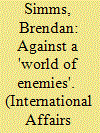

|
|
|
|
|
| Publication |
2014.
|
| Summary/Abstract |
Adolf Hitler's experiences during the First World War have been much discussed, with historians tending to concentrate on his involvement in the fighting and the operational lessons he later claimed to draw. Much less has been written about the impact of the war on his world view, though recent work has tended to suggest that his paranoid anti-Semitism was not yet visible during the conflict. Drawing on this latest research, but also on newly discovered sources and previously underused material, the author shows that Hitler's main preoccupation during the war and its immediate aftermath was the overwhelming power of Great Britain and its American ally. He associated these two powers with the alleged international Jewish economic conspiracy that had crushed the German empire. Hitler's anti-Semitism thus originated in an anti-capitalist, rather than anti-communist, discourse. He blamed Britain and the US for the rigours of the Versailles peace settlement, a moment which was far more politically formative for him than the experience of defeat itself. His encounter with American soldiers in the summer of 1918 also marked his first engagement with the global power of the United States and the start of a belief in the demographic weakness of the German empire which inspired his plans for Lebensraum in the east.
|
|
|
|
|
|
|
|
|
|
|
|
|
|
|
|
| 2 |
ID:
145283
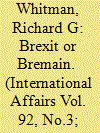

|
|
|
|
|
| Summary/Abstract |
A major public debate on the costs and benefits of the United Kingdom's membership of the European Union is presently under way. The outcome of the referendum on 23 June 2016 will be a pivotal moment in determining whether the EU has a future as a component of the UK's European diplomatic strategy or whether there is a major recalibration of how the UK relates to Europe and more widely of its role within international relations. Since accession to the European Economic Community the UK has evolved an uncodified, multipronged European diplomatic strategy. This has involved the UK seeking to reinforce its approach of shaping the security of the continent, preserving a leading diplomatic role for the UK in managing the international relations of Europe, and to maximize British trade and investment opportunities through a broadening and deepening of Europe as an economically liberal part of the global political economy. Since accession the UK's European diplomatic strategy has also been to use membership of the EU to facilitate the enhancement of its international influence, primarily as a vehicle for leveraging and amplifying broader national foreign and security policy objectives. The strategy has been consistent irrespective of which party has formed the government in the UK. Increasing domestic political difficulties with the process of European integration have now directly impacted on this European strategy with a referendum commitment. Whether a vote for a Brexit or a Bremain, the UK will be confronted with challenges for its future European strategy.
|
|
|
|
|
|
|
|
|
|
|
|
|
|
|
|
| 3 |
ID:
129104
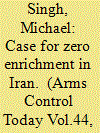

|
|
|
|
|
| Publication |
2014.
|
| Summary/Abstract |
In the debate over sanctions on Iran-their role in bringing Tehran to the negotiating table and their proper place in U.S. diplomatic strategy in the future-scant attention has been paid to a major shift in the negotiating position of the P5+1, the group of six countries (China, France, Germany, Russia, the United Kingdom, and the United States) that is negotiating with Tehran over the Iranian nuclear program. No longer is the P5+1 demanding that Iran halt uranium enrichment. Indeed, in the November 24 first-step nuclear accord, the Joint Plan of Action,[1] the P5+1 all but concedes that Iran will be permitted to enrich in perpetuity. In separate comments that have quickly become conventional wisdom among Iran analysts, U.S. negotiators now characterize their previous position that Iran should halt enrichment as "maximalist."[2] Although undoubtedly expedient, this shift away from a zero-enrichment negotiating position is misguided and unnecessary.[3] The U.S. shift away from zero enrichment to limited enrichment represents a significant diplomatic victory for Iran. For the last decade, the position of the EU-3 (France, Germany, and the UK) and then the P5+1 had been that Iran must "suspend all enrichment-related and reprocessing activities, including research and development." This position was enshrined as an Iranian obligation in a series of UN Security Council resolutions.[4] Iran, however, asserted a "right to enrich" and refused to halt enrichment after resuming it when nuclear talks with the European Union broke down in 2005. This difference formed the core of the confrontation that subsequently developed between Iran and the allies.
|
|
|
|
|
|
|
|
|
|
|
|
|
|
|
|
| 4 |
ID:
104013
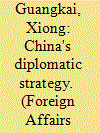

|
|
|
|
|
| Publication |
2010.
|
| Summary/Abstract |
The Chinese term of "Tao Guang Yang Hui" (meaning "not to show off one's capability but to keep a low profile") has become a vital component of China's diplomatic strategy and likewise one of the keywords for understanding and grasping China's foreign policy. A correct understanding and an accurate translation of the term "Tao Guang Yang Hui" is conducive to bringing home to the outside world China's foreign policy, enabling the international community to acquire a better understanding of China's option for a road of peaceful development, and upholding as well as projecting a favorable image of China in the world.
|
|
|
|
|
|
|
|
|
|
|
|
|
|
|
|
| 5 |
ID:
103733
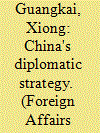

|
|
|
| 6 |
ID:
114773
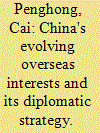

|
|
|
| 7 |
ID:
177073
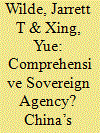

|
|
|
|
|
| Summary/Abstract |
This article investigates the confluence of China’s rise and International Recognition Theory through a quantitative content analysis of 166 joint statements on state visits between China’s heads of state and the representatives of 80 partners. China’s partnership diplomacy is a continuous, comprehensive, and dynamic diplomatic strategy for the 21st century. Yet, extraordinarily little research has explored the substance of China’s partnerships and the international experience that they offer. To investigate these dimensions, this article develops a typology of international recognition within which to situate China’s partnership diplomacy. We find that partnership documents exhibit a gradation of sovereign recognition that is transformed into “Comprehensive Sovereign Agency”: a type of sovereignty with Chinese characteristics that establishes the agency of the Chinese government over the comprehensive spectrum of China’s foreign relations. In contrast to earlier international experiences that ground sovereign agency in the functions of security, China’s partnership diplomacy yields a network that emphasizes the productive (economic, scientific, and cultural) functions of state capacity and international interaction. China’s partnership diplomacy reproduces the bilateral relations of preference and solidarity that ground China’s regime legitimacy in economic development. Its partnerships operate outside of the liberal multilateral security communities that generate international affinity through a difference-blind multilateral framework, constituting instead a difference-sensitive bilateral framework that provides a source of international recognition and sovereign agency that circumvent the liberal international experience.
|
|
|
|
|
|
|
|
|
|
|
|
|
|
|
|
| 8 |
ID:
138995
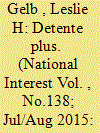

|
|
|
|
|
| Summary/Abstract |
With the Cold War’s demise, the menacing Russia that long loomed over Europe seemed to vanish. The Russia of 1992 was just a fragment of its historic self in military punch and economic weight. Not even Russia’s still-formidable nuclear arsenal deflected perceptions of decline. It was inevitable, then, that Western policy makers would feel that this shrunken Russia was more to be ignored than feared. They were wrong.
|
|
|
|
|
|
|
|
|
|
|
|
|
|
|
|
| 9 |
ID:
104988
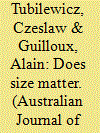

|
|
|
|
|
| Publication |
2011.
|
| Summary/Abstract |
This article is the first systematic attempt at estimating the size of Taiwanese foreign aid and, thus, the cost of Taiwan's aid diplomacy. It questions the Republic of China (ROC) President Ma Ying-jeou's justification of his 'diplomatic truce' with China as necessitated by an ineffectiveness of his predecessor Chen Shui-bian's costly aid diplomacy. Deriving its evidence from the ROC governmental budgets, local media reports and interviews with Taiwanese officials involved in foreign aid implementation, the article argues that President Chen did not engage in 'generous financial aid' and proposes that this parsimony, rather than futility of aid diplomacy as a strategy to expand Taiwan's international space, should be considered as contributing to Taipei's diplomatic failures from 2000 to 2008.
|
|
|
|
|
|
|
|
|
|
|
|
|
|
|
|
| 10 |
ID:
149859
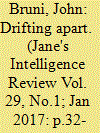

|
|
|
|
|
| Summary/Abstract |
Australia's relationship with China and the United States will be increasingly difficult to balance. In the wake of the US presidential election and subsequent policy uncertainty, and growing assertiveness from Beijing, John Bruni examines the outlook for Canberra.
|
|
|
|
|
|
|
|
|
|
|
|
|
|
|
|
| 11 |
ID:
064666
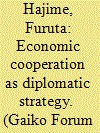

|
|
|
| 12 |
ID:
160771
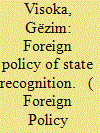

|
|
|
|
|
| Summary/Abstract |
This article explores the policies and activities undertaken by Kosovo as it seeks diplomatic recognition under conditions of contested statehood and transitional international order. Existing debates about diplomatic recognition—in particular, how independent sovereign statehood is achieved—generally rest upon systemic factors, normative institutions, and the preferences of great powers. In contrast, we argue that the experience of Kosovo presents a more complex and less predetermined process of international recognition, in which the agency of fledgling states, diplomatic skill, timing, and even chance may play a far more important role in mobilizing international support for recognition than is generally acknowledged. In building this argument, we explore Kosovo’s path to contested independence and examine the complex process of diplomatic recognition, as well as highlight the hybrid justifications for recognizing Kosovo’s statehood and independence. Without downplaying the importance of systemic factors, this article contributes to a critical rethinking of norms and processes related to state recognition in international affairs, which has implications for a broad range of cases.
|
|
|
|
|
|
|
|
|
|
|
|
|
|
|
|
| 13 |
ID:
156318
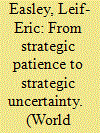

|
|
|
| 14 |
ID:
128261
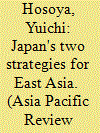

|
|
|
|
|
| Publication |
2013.
|
| Summary/Abstract |
For much of its postwar history, Japan's diplomacy consisted of three pillars: "the United Nations Centrism," "cooperation with free countries," and "being a member of Asia." However, beginning in the twenty-first century, two new diplomatic strategies for East Asia have emerged. These two paths exhibit different philosophies which however share some elements. This article examines the "East Asian Community" vision and the "Arc of Freedom and Prosperity" initiative and identifies the key concepts that they share. Finally, it suggests that if Japan's two foreign policy visions were unified, the strategy would be strengthened.
|
|
|
|
|
|
|
|
|
|
|
|
|
|
|
|
| 15 |
ID:
114988
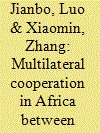

|
|
|
|
|
| Publication |
2011.
|
| Summary/Abstract |
In the 21st century, it is a great event in the field of international politics that both China and Africa are marching towards revival and more cooperation among each other. The old international order which centered on the West can no longer meet the demand of the changes of African geopolitical pattern. Therefore, it is high time to establish a multilateral cooperation mechanism concerning Africa's peace and development. The authors argue that there are differences in historical experience, diplomatic ideas and principles as well as extensive common grounds of diplomatic strategy and national interests between China and the West in respect of their relations with Africa. Both China and the West should promote talks which are more open, more cooperative and more conducive to a win-win end. In doing this, they can achieve a win-for-all result for all the parties involved.
|
|
|
|
|
|
|
|
|
|
|
|
|
|
|
|
| 16 |
ID:
128260
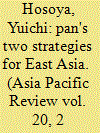

|
|
|
|
|
| Publication |
2013.
|
| Summary/Abstract |
For much of its postwar history, Japan's diplomacy consisted of three pillars: "the United Nations centrism," "cooperation with free countries," and "being a member of Asia." However, beginning in the twenty-first century, two new diplomatic strategies for East Asia have emerged. These two paths exhibit different philosophies which however share some elements. This article examines the "East Asian Community" vision and the "Arc of Freedom and Prosperity" initiative and identifies the key concepts that they share. Finally, it suggests that if Japan's two foreign policy visions were unified, the strategy would be strengthened.
|
|
|
|
|
|
|
|
|
|
|
|
|
|
|
|
| 17 |
ID:
103155
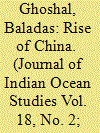

|
|
|
| 18 |
ID:
127675
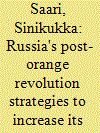

|
|
|
|
|
| Publication |
2014.
|
| Summary/Abstract |
The role of public diplomacy in Russian foreign policy has grown in recent years. There are two distinctive strands of Russian public diplomacy: one directed mainly towards Western states, and one towards the former Soviet republics. Despite the rhetoric of mutual interests and high respect for state sovereignty, the post-Soviet strand of Russian public diplomacy has more in common with the Soviet practice of 'active measures' than with the soft power of attraction commonly connected with public diplomacy. Russia's current policy runs the risk of eating away the soft power potential that Russia still enjoys in many post-Soviet states.
|
|
|
|
|
|
|
|
|
|
|
|
|
|
|
|
| 19 |
ID:
024031
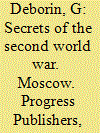

|
|
|
|
|
| Publication |
Moscow, Progress Publishers, 1971.
|
| Description |
277p.Hbk
|
|
|
|
|
|
|
|
|
|
|
|
Copies: C:1/I:0,R:0,Q:0
Circulation
| Accession# | Call# | Current Location | Status | Policy | Location |
| 009436 | 940.5311/DEB 009436 | Main | On Shelf | General | |
|
|
|
|
| 20 |
ID:
094413
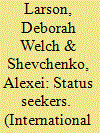

|
|
|
|
|
| Publication |
2010.
|
| Summary/Abstract |
The United States needs support from other states to carry out global governance, particularly from rising powers such as China and Russia. Securing cooperation from China and Russia poses special problems, however, because neither state is part of the liberal Western community, ruling out appeals to common values and norms. Nevertheless, an alternative approach that is rooted in appreciation of China's and Russia's heightened status concerns may be viable. Since the end of the Cold War, Chinese and Russian foreign policy has been shaped by the goal of restoring both countries' great power status, which received major blows after China's Tiananmen Square repression and the Soviet Union's breakup and loss of empire. This desire for status can be explained by social identity theory, which argues that social groups strive for a distinctive, positive identity. Social identity theory provides a typology of strategies that states may use to enhance their relative status and suggests appropriate responses to status concerns of rising powers. Redirecting scholarly attention to status considerations and incentives could contribute to a diplomatic strategy for engaging rising powers.
|
|
|
|
|
|
|
|
|
|
|
|
|
|
|
|
|
|
|
|
|